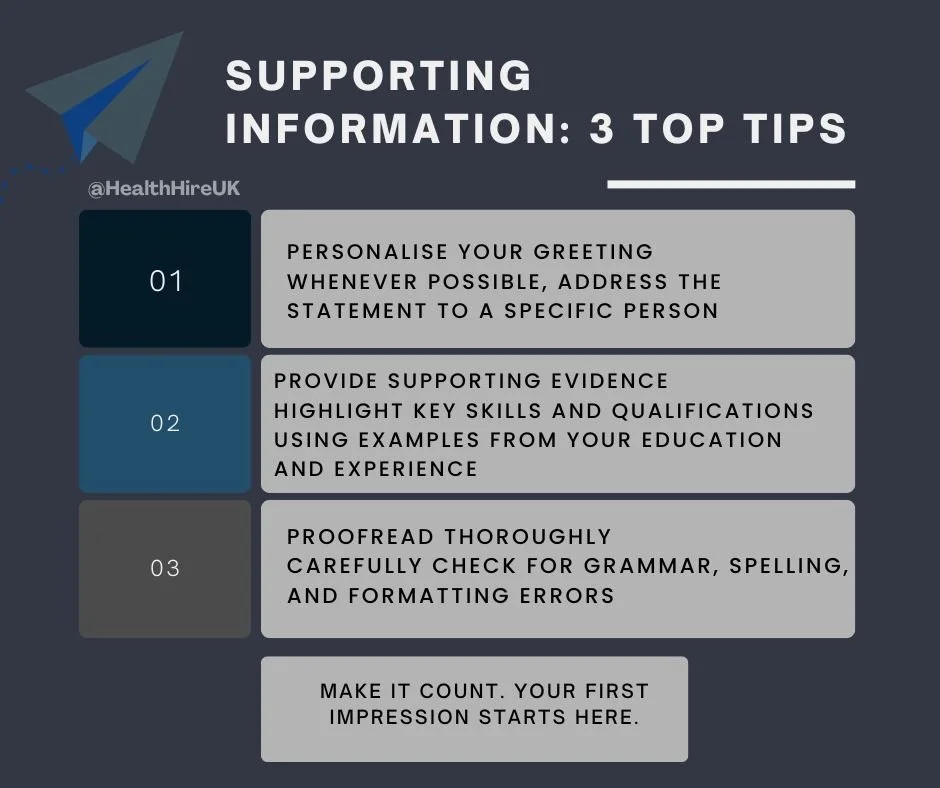NHS Supporting Information (With Examples)
When applying for healthcare roles in the UK your supporting information is one of the most important tools at your disposal. It’s your opportunity to connect the dots for the employer, showing not just what you’ve done, but why you’re the right fit for the role.
Why Your Supporting Information Matters
In a competitive job market, employers often receive hundreds of applications. A well-written supporting information can help your application stand out by presenting your qualifications in a focused and engaging way. Think of it as your professional pitch—a chance to showcase your enthusiasm, clarify your motivations, and demonstrate how your background makes you the ideal candidate.
How to Structure a Strong Supporting Information
A successful supporting information is clear, concise, and structured logically. Remember the word limit is just that, a limit! It is not a target to meet. Aim to keep it as concise as possible or you risk losing the reader’s attention. Below is a simple but effective structure you can follow:
1. Introduction: Your Interest and Intentions
Start by stating clearly the position you're applying for and how you came across the job opportunity. Express your enthusiasm for the role and the organisation. In one or two lines, give a strong, confident indication of why you believe you’re a suitable candidate.
Example:
“I am writing to apply for the position of Clinical Support Worker at ABC Healthcare, as advertised on HealthHireUK. With a strong background in patient care and a commitment to compassionate, efficient service, I believe I would be a valuable addition to your team.”
2. Highlighting Key Skills and Experience
Pick 1–2 skills that are directly relevant to the job description—such as communication, teamwork, patient care, or administrative efficiency—and support them with brief, real-world examples.
Example:
“During my time as a healthcare assistant at XYZ Hospital, I worked closely with multidisciplinary teams to deliver high-quality patient care. I developed strong communication skills through regular interaction with patients and their families, ensuring they were informed, comfortable, and supported throughout their care journey. My ability to remain calm under pressure proved vital in emergency situations, especially during night shifts in the A&E department.”
3. Education and Professional Development
In this next paragraph, summarise your relevant educational background, certifications, or ongoing professional development. If your education isn’t particularly relevant to the role, focus instead on professional training or transferable experience.
Example:
“I hold a Level 3 Diploma in Health and Social Care and have completed additional training in infection control and manual handling. These qualifications have equipped me with both the theoretical understanding and the practical skills needed to thrive in a fast-paced healthcare environment.”
4. Closing: Polite, Professional, and Forward-Looking
Close your letter with a positive tone. Express your desire to contribute to the team, reaffirm your suitability for the role, and politely signal your availability for an interview. Don’t forget to thank the employer for their time and consideration.
Example:
“I would welcome the opportunity to contribute to your outstanding care team and am confident that my experience and values align with your organisation’s mission. I am available for interview at your convenience and look forward to the possibility of discussing this opportunity further. Thank you for considering my application.”
👉 For an in-depth review, explore our video which talks you through the process of writing your supporting information.
Next Steps
Our next article ‘what to do after submitting your application’ will give you an insight into how to further improve your chances of securing a NHS job.
Final Thoughts
Your supporting information is more than just an introduction—it’s a vital piece of your application that can set the tone for everything else.
Take the time to craft a thoughtful, personalised supporting information for each application. It may take extra effort, but it can be the deciding factor in whether you’re shortlisted for interview—or passed over.
Important Message
We hope you find this article useful. If you are interested in our experts guiding you through the NHS application process, you may be interested in our service.
Our experts will write your full NHS Application including tailored supporting information, guide you step by step from finding jobs to applying for jobs, and also give you a list of NHS interview questions.
We help hundreds of candidates each month and you could be our next success story. If you are interested in our services, please click here to purchase (Use code NHS50) or fill this form out and our team will be in touch with you.
